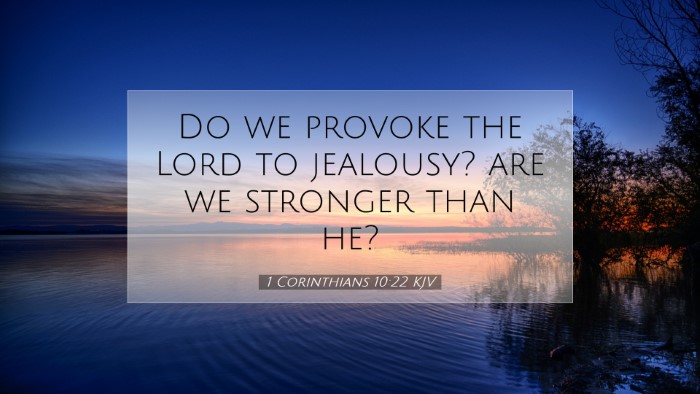1 Corinthians 10:22 Commentary
The verse states: "Do we provoke the Lord to jealousy? Are we stronger than he?"
Contextual Background
This portion of Paul's letter to the Corinthians addresses various issues concerning
Christian liberty, idol worship, and the relationship between believers and the wider
cultural practices of their time. The Corinthian church struggled with integrating their
newfound faith with their past pagan practices.
In chapter 10, Paul recounts the historical Israelite experience, warning the Corinthians
against idolatry and its consequences. He emphasizes that participation in the rites of
idol worship not only distances them from God but also provokes His righteous jealousy.
Analysis of Key Phrases
“Do we provoke the Lord to jealousy?”
Paul personifies God’s response to sin by speaking of jealousy, a term that reflects God's
passionate commitment to His covenant people. Matthew Henry notes that jealousy here indicates
a protective love, whereby God seeks to guard His people from the harm of idolatry. This is reminiscent
of the Old Testament description of God’s character in Exodus 20:5, where God warns that He is a
jealous God, who does not tolerate competing loyalties.
“Are we stronger than he?”
This rhetorical question serves to remind believers of their inherent weakness in comparison
to God’s omnipotence. Albert Barnes emphasizes that no human effort can withstand divine authority
and judgment. Any attempt to assert independence from God is futile and dangerous, leading to
accountability for one's actions.
Theological Implications
- God’s Jealousy and Holiness:
The concept of God's jealousy teaches us about His holiness and desire for exclusive
devotion. Adam Clarke elaborates on how believers are called to live in a manner that honors
God’s sovereignty, highlighting the danger of complacency in spiritual matters.
- Response to Idolatry:
Paul's admonition serves as a clarion call against idolatry, which can manifest not only
in physical representations but also in the prioritization of personal desires over God's
commandments. Pastors and theologians should continually challenge their congregations to examine
their own hearts for modern idolatry.
- The Nature of Spiritual Warfare:
This verse implies an ongoing battle for the hearts of believers. There exists a
constant pull from cultural practices and societal norms that can lead to compromises in faith.
Spiritual leaders must equip their communities to understand this struggle and empower them
to stand firm in their convictions, as per the exhortations found throughout the New Testament.
Practical Applications
In light of this verse, it is crucial for Christians to cultivate a sensitivity to the
implications of their actions and attitudes. Pastors and leaders should consider the following:
-
Examine Loyalty:
Encourage congregants to evaluate what or who they are truly loyal to. Are their values
shaped more by cultural trends than by biblical truth?
-
Foster Integrity:
Life in the modern world may endorse various forms of idolatry—success, wealth,
or pleasure. Pastors should cry out against these norms, reminding believers that true
freedom is found in Christ.
-
Emphasize Dependence on God:
The acknowledgment of our weakness in the face of God’s sovereignty requires a
deepened reliance on His strength through prayer, Scripture, and fellowship within the
body of Christ.
Conclusion
1 Corinthians 10:22 serves as a stern reminder of the seriousness of spiritual fidelity.
Believers are called not only to recognize the importance of their relationship with God but also
to guard it against external influences that seek to dilute their faith. As we reflect on this verse,
we are charged to maintain our devotion, understanding that our spiritual choices have profound
implications both for ourselves and the communities we inhabit. The overwhelming strength of God
beckons us to live in reverence, awe, and consistent obedience.


